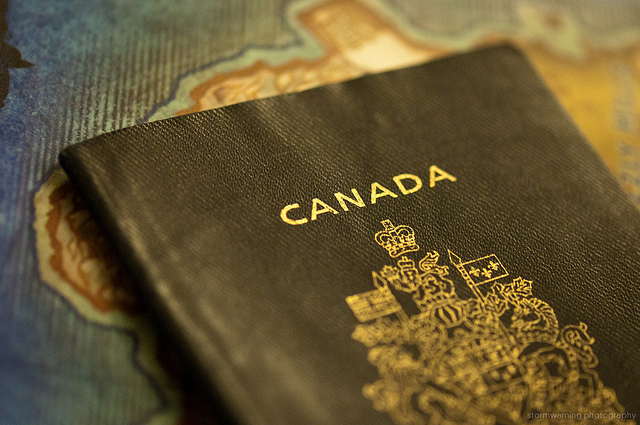On October 9, 2014, live-in caregivers and their allies held simultaneous media briefings in Vancouver, Toronto and Ottawa to call for landed status upon arrival for live-in caregivers and to denounce the Conservative government’s proposed changes to the Live-in Caregiver Program (LCP).
These proposed changes, introduced by Immigration Minister Chris Alexander and members of his staff during closed-door consultations in July, include lifting restrictions on live-in caregivers’ ability to study and work part-time, removing the live-in requirement and making it harder for live-in caregivers to get Canadian permanent residency by funnelling their applications through the “Express Entry” program.
The removal of live-in caregivers’ automatic ability to apply for permanent residency after completing the LCP’s 24 month live-in work requirement motivated live-in caregivers to organize against Alexander’s proposals in the first place. They opposed the secretive and inaccessible nature of the consultations and believed that more voices, particularly those of live-in caregivers who would be directly affected by the changes, should be heard.
The media briefings allowed live-in caregivers to voice their concerns about the changes.
All of them insisted that they only became live-in caregivers because of the promise of being able to settle in Canada with their families. Otherwise, they would not have opted to live apart from their families.
The importance of landed status upon arrival
During the briefings, spokespersons for Migrante-BC in Vancouver, the Caregiver Action Centre (CAC) in Toronto and the Philippine Migrants Society of Canada (PMSC) in Ottawa opposed placing live-in caregivers’ permanent residency applications with the “Express Entry” program, which they believed would drastically reduce the numbers of live-in caregivers who would be able to receive permanent residency.
Instead, they argued that live-in caregivers should automatically receive permanent residency upon arriving in Canada.
When asked why live-in caregivers should be granted landed status upon arrival, Migrante-BC’s Jane Ordinario asserted that doing so would allow live-in caregivers to exercise their labour rights. Because live-in caregivers can only apply for Canadian permanent residency upon completing 24 months of live-in care work, they are more likely to withstand abusive situations so as not to jeopardize their permanent residency applications. Landed status upon arrival would reduce abuse.
Ordinario points to how denying live-in caregivers permanent residency upon arrival perpetuates Canada’s historical practice of excluding people of colour from permanent settlement.
“The history of Canada is full of examples of its racist treatment of immigrants and migrants of colour, unmindful of their contributions to Canada — from the Chinese railway workers, the Caribbean and Jamaican women domestics, the East Indian mill workers, Japanese Canadians, and the more recent Filipino domestic workers,” says Ordinario.
Exactly why live-in caregivers do not have access to Canadian permanent residency upon arrival when their English and Irish predecessors were able to come to Canada as citizens underscores these racial exclusions.
Aimee Beboso from PMSC affirms Ordinario’s observations, arguing that “live-in caregivers not only provide quality and in-demand care to Canadian families, they are also consistently supporting Canada’s economy while working and contributing to it’s social system.”
Beboso believes that because live-in caregivers make meaningful economic and social contributions to Canada, they should be treated like other immigrants and be given landed status upon arrival.
Past campaigns, future initiatives
The campaign for live-in caregivers’ rights is not new.
Coco Diaz, who was present during the Toronto media briefings and has been in the forefront of activism on behalf of live-in caregivers since the late 1970s, emphasized that live-in caregivers have always fought for their rights.
Live-in caregivers’ activism in the late 1970s, in fact, was a key reason why they were allowed to apply for permanent residency through the Foreign Domestics Movement (FDM), established in 1981 and replaced by the LCP in 1992. CAC’s Pura Velasco, another long-time live-in caregiver activist, reminded everyone that because live-in caregivers are “good enough to work,” they are “good enough to stay in Canada,” which was a call that had as much relevance in the late 1970s as it does today.
CAC, Migrante-BC and PMSC emphasize that they are only getting started with their campaign to oppose Alexander’s proposals.
CAC will soon be releasing to the Canadian public a series of videos that probe more deeply into the situations facing live-in caregivers. Migrante-BC plans to draw attention to the issue during International Migrants’ Day in November and International Human Rights Day in December, and will concurrently lobby the Canadian government to ratify the International Migrant Workers Convention and the International Domestic Workers Convention.
PMSC will continue with its educational and outreach campaigns informing the Canadian public and live-in caregivers of Alexander’s proposals.
All three organizations will continue working together in pushing for landed status upon arrival for caregivers.
Federal government representatives refuse to comment on this matter.
Ethel Tungohan is a community advocate and a Grant Notley postdoctoral fellow at the University of Alberta.
Photo: flickr/Jeff Nelson




